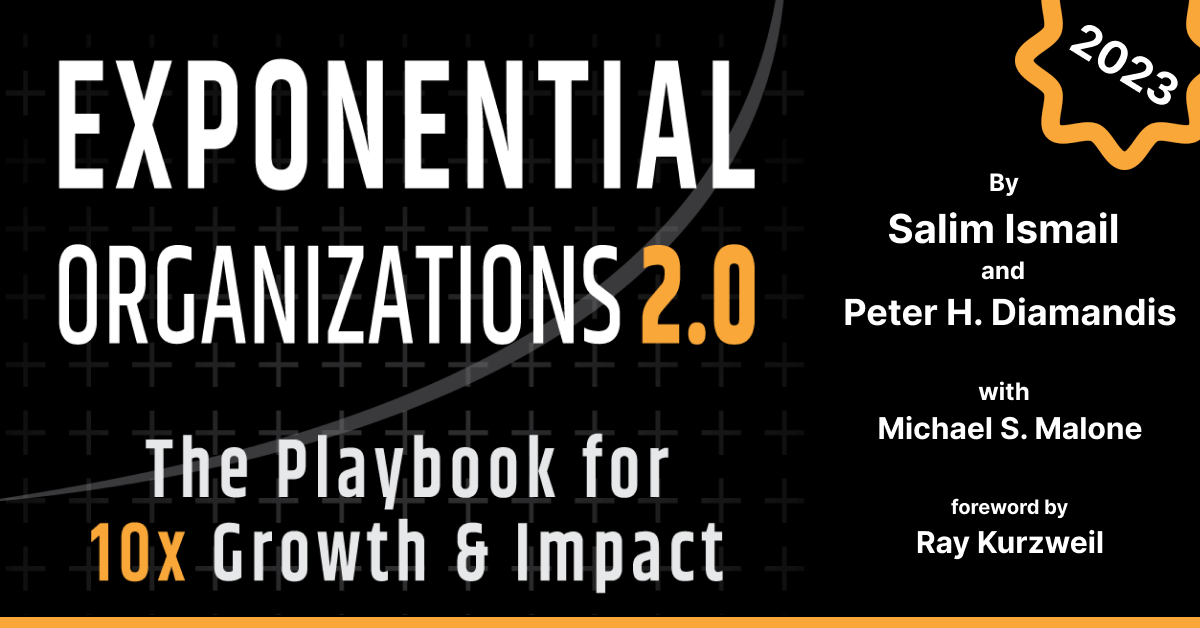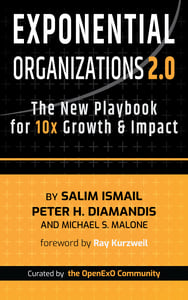In Salim Ismail's captivating exploration, "Exponential Organizations," the celebrated futurist and strategist opened the doors to bold foresight.
Among his most daring predictions? The death of top-down, predictable organisations and a new wave of leadership and structures paving the way for exponential growth.
And while theory and practice can have a world’s difference in between, the mission is to not be right or wrong. It’s having the courage to ask big questions and unlocking insights along the way.
This is the whole point of “Exponential Organizations 2.0” — Ismail’s follow-up to his groundbreaking work, now dubbed as the new playbook for growth and impact.
Armed with years worth of insights, we now ask — who is doing exponential (ExO) best? What can we learn from organisations who missed the memo? Could AI possibly replace the C-suite? And what’s the one question we should all be asking in today’s age?
In this exclusive interview, pick the mind of “Exponential Organizations 2.0” author Salim Ismail and explore what this new era can mean for organisations now that we know better and more than we ever did.
Insight: Our stone-age emotions, medieval institutions, and godlike technology call for a new way of thinking and relating to the world.
Data: Organisations implementing the ExO success formula deliver over 40x higher shareholder returns, 2.6 better revenue growth, 6.8x higher profitability and 11.7x better asset turnover. (OpenExO)
What’s the step change: Adopt the mindset needed to build an organisation that is scalable, fast-moving, and smart for a better chance of success.

Image from OpenExO
But first — what is an exponential organisation?
An Exponential Organisation (ExO) is like a supercharged engine for impact, generating at least 10 times greater outcomes than its peers. How? By harnessing cutting-edge organisational techniques that ride the wave of accelerating technologies. These game-changers are powered by information technologies, transforming what was once tangible into the digital realm, available on demand.
How do the first and second books differ?

"Exponential Organizations 2.0" expands upon the foundational concepts of its 2014 predecessor, offering fresh insights and strategies tailored for today's rapidly evolving business environment with:
- Updated Content – Incorporating new case studies and data from the OpenExO community, the book provides timely perspectives on the ExO phenomenon.
- Revised Playbook – The revised playbook equips management teams with updated strategies to navigate hyper-accelerated innovation and competition.
- Expanded Insights – Delving deeper into ExO dynamics, the new edition offers a comprehensive understanding of how these organisations operate and succeed.
- Focus on Community – The book emphasises collaborative networks and underscores the role of the community in scaling ExOs and driving exponential growth.
- Emphasis on Mindset – Concluding with a focus on mindset, the book inspires readers to adopt a forward-thinking approach akin to the neural networks driving exponential innovation.
What does this have to do with my business?
Let's break down the 10 key takeaways from Step Change CEO Ashton Bishop and "ExO 2.0" author Salim Ismail’s exclusive interview, with insights on what this means for your future and how you can leverage ExO principles today.
1. The rise of “living banks of data”
Dubbed as a “living book", “Exponential Organizations 2.0” gives us a glimpse of what a world with open-source databases could be like.
Apart from print, “ExO 2.0” is available online with an AI chatbot to help readers distil insights. While it builds on content from Ismail’s previous work, this book is 90% new, thanks to a community of researchers and experts who have pitched in to share what they’ve seen and learned about how ExO has played out.
With the rise of “living banks of data,” anyone searching for answers can access real-time peer-reviewed insights. This means they can also act, pivot, and innovate — working and operating from information that’s always up to date and never obsolete.
In Ismail's words, "The reason we call it a living book is we're going to keep updating it because the material is changing all the time… And that's now open-sourced. Anybody can pick it up and run with it.”
2. The development of an AI C-Suite and workforce-on-demand
Even executive roles aren’t spared from the human vs AI discussion. For Ismail, the same can be said with ExO 2.0.
Picture the AI counterpart for C-Suite, meticulously crafted to harness the wisdom of seasoned executives and deliver unparalleled strategic insights. The goal? To streamline operations and free up human executives for intuitive oversight and ingenuity.
At the core of this is an overarching movement — flexible staffing models and a 'workforce on demand' ethos. With the speed of AI, it’s not difficult to imagine companies tapping into a pool of contract-based and independent workers who fill the gaps and swiftly adapt to project needs at lightning-speed and on-demand — ultimately challenging even the most flexible work setups of today.
“We think in the next few years, there'll be 30% contractors and independent workers in a big company. And so the boundary lines of the actual organisation are blurring and melting away. Because one of your tenets is sort of workforce on demand, the ability to scale up, scale down.” Ismail predicts.
3. Linear organisations are falling behind more than ever
If there’s anything that surprised Ismail the most while revisiting his work — it’s that the ExO model does work.
It's becoming crystal clear that traditional organisational structures are encountering some serious hurdles. When OpenExO compared the top 10 most agile organisations with their less EXO-friendly counterparts over a seven-year stretch, they found massive differences in revenue growth, profitability, and shareholder returns – up to 40 times higher.
Flexibility, agility, and purpose-driven structures aren't just buzzwords anymore. It’s crucial for staying relevant and competitive in the years ahead.
“We have a very clear determination now that pretty much over the next 10 years or so, every company, nonprofit, impact project, government department will be organised in this way (ExO) just because it's just better.” says Ismail.
4. Purpose isn’t just for customers
For the longest time, purpose has always been centred on customers. But ExOs know better.
More than just a brand promise, a Massive Transformational Purpose defines the fundamental problem an organisation aims to tackle, serving as a beacon of clarity and inspiration.
And it’s not just for the boardroom either. It's now a rallying cry that resonates with employees, especially the younger generation seeking meaningful work. Because exponential growth comes with exponential opportunities and challenges — you need a compass to guide your organisation through that transition for longevity.
Companies that recognise the importance of aligning individual passions with the overarching purpose foster a culture of engagement and innovation, propelling them towards a brighter, purpose-driven future.
“When you're going through rapid growth, you want to very quickly evaluate which projects fit that MTP or don't. And it acts as the North star for the company.” Ismail presses.
5. The technology we have is outpacing us more than ever
It's no secret that some areas have caught us by surprise while others have moved slower than anticipated.
Ismail admits to underestimating Bitcoin and the whole crypto realm. He knew it was going to be big, but the speed at which it’s skyrocketed is something else entirely.
On the flip side, areas Ismail thought would be zipping along by now, like autonomous cars, are trailing behind than expected. Yet, despite the setbacks, slowly teaching machines to navigate the complex nuances of the road is a job cut out for human ingenuity. And the same can be said for the gaps left by AI in other sectors.
But underneath this is one trend — that the speed of technology will come gradually and then hit us suddenly so quickly that it could be challenging to keep up with its implications.
“We're reaching the limits of deep learning and we need the next breakthrough and we don't know what that is. The problem with exponential technologies is there’s an arbitrarily long flat period of the curve before it takes off, right?” Ismail quips.
6. Beware of legacy mindsets
If Ismail were in charge, Satya Nadella’s leadership in Microsoft deserves a Nobel Prize in ExO.
But he also warns of the opposite mindset that has set many legacy brands down the path of irrelevance. Certain automotive giants initially underestimated disruptive forces like Tesla. Despite warnings, they clung to outdated processes and failed to foresee the seismic shift toward electric vehicles. This resistance to change is what stands in the way of innovation.
The good thing is it's never too late to pivot. Disruptive experimentation and permissionless innovation aren’t reserved for the elites. Agility is your greatest asset in a world where change is the only constant.
“I think that's the paradigm that is going to carry the world forward now. Young people basically picking up these technologies and doing things with them because you can't police all of them and everything that's going on. You can't regulate in time. And I think that's what's going to drive the world forward.” Ismail says.
7. Humanity’s next biggest transition is happening right now
It's an incredibly exciting (and overwhelming) time to be alive with all the changes happening right under our noses.
Ismail muses that the following sectors will face major shake-ups — Bitcoin and blockchain, biotech, and renewable energy.
While Bitcoin and blockchain have already been in the spotlight, the best is yet to come. Then there's biotech, a game-changer that's just getting started. Imagine tweaking your DNA as easily as editing a Word document. Mindblowing. Meanwhile, renewable energy, especially solar power, is doubling in efficiency every 22 months, paving the way for a world where energy isn't a luxury but a readily available resource.
The implications? A whole new landscape for global economics. But there are hurdles to clear. We're at a crossroads where we can either embrace a Star Trek-esque future of unity and progress or stumble into a Mad Max-style dystopia. With challenges like geopolitical tensions and the ongoing climate crisis, the path forward isn't always clear.
Yet, here's where we come in. We have the power to shape our future. Technology has given us the tools. Now, it's up to us and ExOs to use them wisely.
“We've got two futures as a human species. We've got a ‘Star Trek’ future or a ‘Mad Max’ future… The next 20 to 30 years will dictate the next few centuries of humanity. We're one of those inflection points that's absolutely critical. And absolutely the biggest transition in the history of humanity is happening like right now.” Ismail emphasises.
8. Experimentation trumps experience in leadership
Gone are the days when decades of experience alone could lead us.
Instead, we need leaders who aren’t tethered to the past, who thrive on the insights gleaned from running countless experiments and ruthlessly following the data trail. A leader armed not just with intuition honed over years, but with a toolkit of relentless experimentation and data analytics. In the same way titans like Google, Amazon, and Facebook rose not solely on gut instinct but also by being data-driven.
This means departing from the comfort of traditional leadership models, taking a courageous leap into uncertainty, and preparing for the next horizons.
“They talk in the US about the big seven, like Google, Amazon, Facebook, et cetera. The reason they're that successful is that they're ruthlessly data-driven… Very few other people have the gumption to look out in 10 years.” Ismail points out.
9. Communities produce the best thinking
How does one develop ideas that push the borders of what we know?
In ExO, vibrant communities trump solitary geniuses. Communities are the incubators of brilliant ideas and the catalysts for groundbreaking innovations. Insights from “Exponential Organizations 2.0” are distilled from the OpenEXO community, where passionate individuals come together to pool their knowledge, experiences, and discoveries.
Within these nurturing ecosystems, barriers dissolve, egos take a back seat, and pursuing knowledge becomes a shared adventure. This makes it easier to connect seemingly unrelated dots, revealing patterns and opportunities that would have remained hidden from the lone thinker.
“I've got the unbelievable good fortune of having my entire community of much smarter people around me… And so if I sound smart, it's because I've got access to those buckets of people. And so our suggestion is to join the community.” Ismail shares.
10. The move from intelligence to consciousness
Is it time to map the transition from intelligence to consciousness? This is Ismail’s one question.
IQ tests cover some aspects of intelligence, like quick thinking and concept matching, but they also miss out on so much — like spatial, emotional, and cognitive intelligence.
So, when we say we want AI to be smarter, we might actually be yearning for a deeper level of consciousness. It's about being more than just clever. It's about being truly aware, in tune with ourselves and the world around us. This era we're living in is the perfect playground for exploring consciousness.
Thanks to technology, we've carved out more time to ponder the mysteries of existence, to connect with others, and to tap into our soul's purpose.
“We don't measure spatial, cognitive, or emotional intelligence. Or the Eastern concept of presence or awareness... What do you mean by smarter, right? I think when you say smarter, I think you really mean more conscious.” Ismail muses.
Tying It Together
At the core of the ExO model lies a profound understanding of the power of mindset.
Shaping our minds with the right perspective is key to conquering the challenges that come with a world of exponential changes. When we see a change in mindset as growth instead of a hurdle, we open doors for meaningful innovation.
Gone are the days of rigid hierarchies. Instead, a new era of agile, forward-thinking structures is upon us. By embracing these key takeaways and adopting the ExO mindset, we equip ourselves to ride this wave of transformation, positioning our organisations for success in an ever-evolving world.



